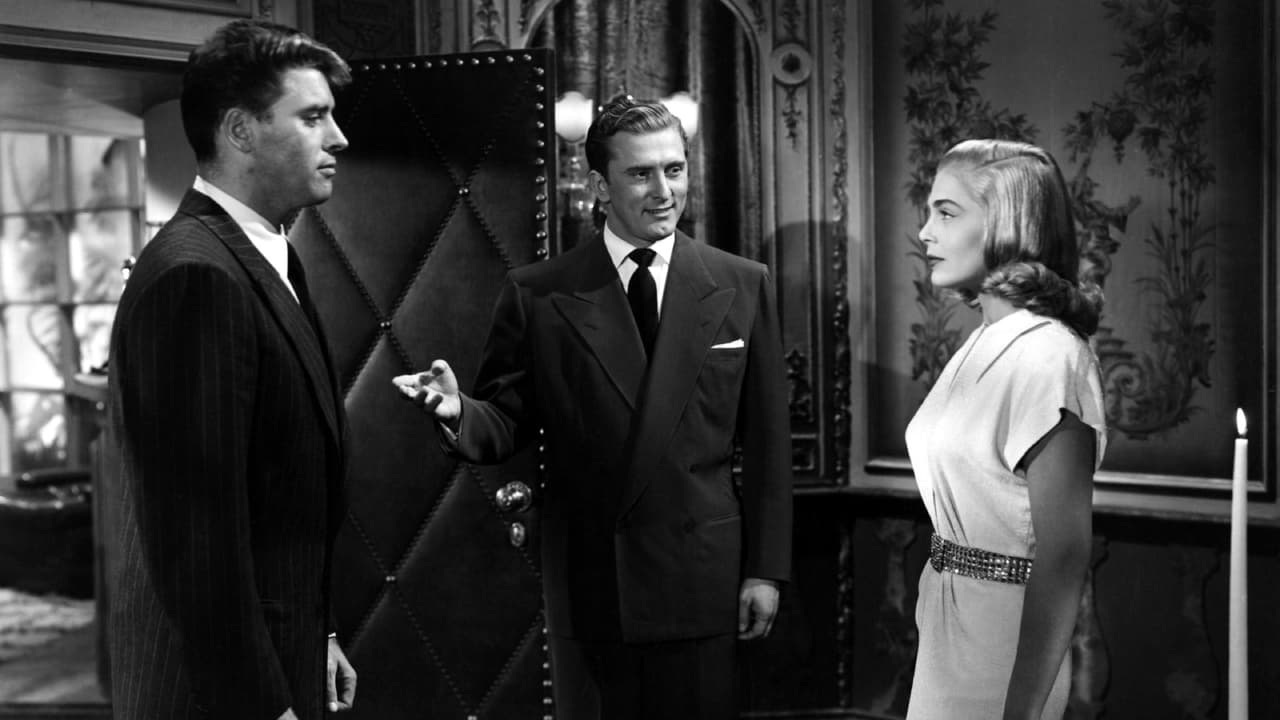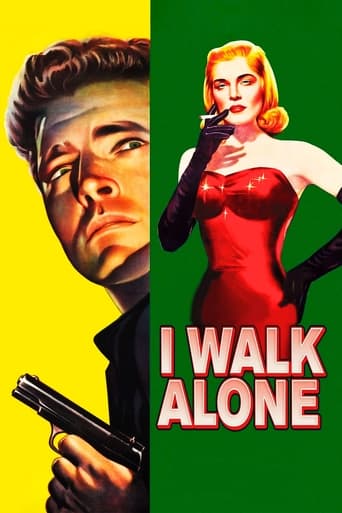

If the ambition is to provide two hours of instantly forgettable, popcorn-munching escapism, it succeeds.
... View MoreBlending excellent reporting and strong storytelling, this is a disturbing film truly stranger than fiction
... View MoreA terrific literary drama and character piece that shows how the process of creating art can be seen differently by those doing it and those looking at it from the outside.
... View MoreThe movie turns out to be a little better than the average. Starting from a romantic formula often seen in the cinema, it ends in the most predictable (and somewhat bland) way.
... View MoreHaving spent 14 years in prison for crimes during prohibition, the melancholy Burt Lancaster has returned home to try to muscle in on what he rightfully believes is partially his, now controlled by old pal Kirk Douglas who has turned their previous illegal enterprise into a corporation. Douglas's bookkeeper (Wendell Corey), a younger brother figure to Lancaster, has greatly aged in Lancaster's time away, obviously consumed with guilt over the illegal activities he has had to do at Douglas's demands, and now must keep Lancaster at bay as well. Lancaster takes it into his own hands to try to force his way in, but as Douglas charmingly tells him, only the board of directors can approve such changes. This leads to Douglas having Lancaster badly beaten up and turns Douglas's songstress mistress (Lizabeth Scott) onto Lancaster's side, tired of Douglas's involvement with a pushy, wealthy widow (Kristen Miller). Sudden betrayal leads to Lancaster being accused of murder, and along with Scott, Lancaster must find a way of clearing his name and see justice finally served, in this case, a cold dish as justice through revenge is normally presented.Along with "The Strange Loves of Martha Ivers", "Desert Fury" and many others, this is a series of Hal B. Wallis produced film noirs where many of the same actors got together as sort of a repertoire company to show off the dark sides of the post war society. Whether returning from war duty, prison, out of town jobs or just drifting along, many of the protagonists here found themselves up against evils they couldn't control, yet were far from noble characters themselves. Lancaster's Frankie is moody, amoral and not above breaking the law. Yet he is aware that he had broke the law which sent him up the river, but is bitter because nobody from the old rackets stood beside him. Douglas, smiling and sly, is a great villain, while Corey is appropriately stone cold as a character barely living whom Lancaster notices seems older than him even though he's younger. Scott, who could go from cold and calculating to purring like a kitten, is a combination of a vixen and a very melancholy baby, but knowing when a bad deal is done, even by the man she thinks she loves. Originally considered for Scott's role, Kristen Miller is deliciously bitchy and cold as the nasty socialite keeping Douglas under her thumb. Unfortunately, her role is underdeveloped, and she pretty much disappears from the second half of the film.Having seen Lancaster (in a good guy role), Scott (in a very similar part) and Corey (in a supporting role with homosexual overtones) in the color film noir "Desert Fury", I wanted to see how this would compare, and found it to be even better. Douglas basically plays the type of part that John Hodiak had been cast in "Desert Fury", but there are enough twists and turns to make this unique. The film is elaborately designed and photographed, especially the elegant nightclub, and deliciously darkly lit for the intense finale where everything comes out into the open. Then there are some great outdoor shots of Lancaster and Scott on the run, going back into the city for the final confrontation, unconcerned about Lancaster being looked for by the police for murder as he knows they would be looking for him the opposite way. The musical score in the background nicely adds to the tension, although i would have loved to have heard the title song used more often rather than the upbeat jazzy way it is briefly heard. Still, this is one of the better late 40's film noir with an outstanding cast and everything else pulling it together in a tight little package.
... View MoreFantastic spin on a gangster movie. Lancaster is "old technology" coming back from 13 years in prison. When he went in brute force for running liquor was the path to success. Now his partner, the unctuous Kirk Douglas, using corporate rules is on top. Lancaster is a Rip Van Winkle...a man out of time, puzzled, unable to comprehend the source of Douglas' wealth and position. It takes him a while (understandable for a man who has been in prison, in an age where there was no TV or Web) to figure out how the game has changed. This film reminded me almost of Wall Street! Lancaster, the man who "works with his hands" (even if that means socking a guy) and Douglas (funny...where have I heard that name before...) a guy who uses his cunning and brains, has built a wall of legality and subterfuge to rob Lancaster of his due! Every minute was worthwhile.
... View MoreI like I WALK ALONE. It is an interesting example of film noir, but it also has curious slants of it's own. It is also one of the first pairings of Kirk Douglas and Burt Lancaster in film. Douglas and Lancaster were so well balanced in their movies that they were interchangeable. While in most of them they were allies or buddies (THE DEVIL'S DESCIPLE, GUNFIGHT AT O.K. CORRAL, TOUGH GUYS) they could alternate as the villain against each other. It's hard to find a pair of actors who did this as well or at all. Matthau and Lemmon usually were in comedies (although they both could be at loggerheads on some ethical points or past history). Grant and Ralph Bellamy are normally love rivals (Bellamy being hopelessly outclassed). Crosby and Fitzgerald are usually in a battle of the generations, and a confrontation of two street smart types. And so it goes in other male pairings.SPOILERS AHEAD: Here, Kirk is the villain - he got away with a large stolen cash prize in a crime back in the 1920s/early 1930s. His partner Burt got caught, and was sent to prison for 14 years (actually rather lucky for him - a cop was killed). Burt is now out of prison, and he discovers that Kirk is quite a social success. He took the money and used it to build a gang, but he was smart enough to use his profits to get a legitimate sheen to his image: he's a successful "nightclub" owner with many wealthy friends and customers. One of the best moments early in the film is when Lancaster sees newspapers and magazines that show Douglas swanning with the swells (even wearing top hat and overcoat in a rotogravure shot). Not quite like the good old Dillinger days, or even Al Capone.Other films had touched upon the "legitimization" of mob money as time passed. In THE ROARING TWENTIES, while Jimmy Cagney is building up his hooch empire he invests the money in a legitimate taxi company (an early example of money laundering), only to lose everything when the stock market crashes. Ironically, his untrustworthy second-in-command (Humphrey Bogart) never diversifies but keeps to the illegal activities. He not only survives the crash, but he profits by it (taking over Cagney's property - though he contemptuously leaves him one taxicab). But even he tries to pick up a better public image - you see him practicing his putting in his office at one point.Lancaster confronts Douglas in his nightclub, only to be brought into the modern world of organized crime. All Lancaster really wants is his half of the original money. But as Douglas' accountant, Wendell Corey, says they can't just give him the cash as it has been invested throughout Douglas's financial empire. Lancaster is left without cash, and led a chase as well by Douglas using Lizbeth Scott as femme fatale bait. He ends up getting beaten (by Mike Mazurki). But he remains determined to beat Douglas and get his share.He does in a manner that today would not pass muster. He entraps Douglas by pretending to have him at the end of a loaded gun, forcing Douglas to make a confession before the police. Douglas, naturally frightened, does admit information that only the criminal involved in the crime would have known, but at the end, he sneers at Lancaster saying that the confession was gotten under duress. But then Lancaster shows his gun was empty. Civil libertarians today would denounce this trick, saying the confession was tainted. In 1948 it was perfectly legal.
... View MoreThe screenplay and the directing may seem a bit hackneyed to some,but Lancaster's problems,trapped in the mystery of economics and club management are rather intriguing.The essential lies elsewhere:watching the Lancaster/Douglas team is enough to satisfy the cine buff;they are so good than even when they work with inferior material,they are still better than most of the rest. Douglas is icily suave,treating his old pal to a meal of canard à l'orange with vintage Champagne.But if looks could kill,his certainly would.Lancaster is a mistreated,thrown into jail (14 years!),cheated good guy ,but who will play fair game till the end.Between these two men ,there's of course a woman:unlike today's female parts,this one is not sacrificed .Lizabeth Scott's performance is first-class and on a par with the two male parts.Too bad her career should have ended so prematurely.She easily equals Laureen Bacall,she's even more human.It's strange how Douglas 's first parts were often villains (this movie,the loves of Martha Ivers) which culminated with Billy Wilder's highly superior "the big carnival".This movie proves that three good leads can give a banal plot substance.
... View More